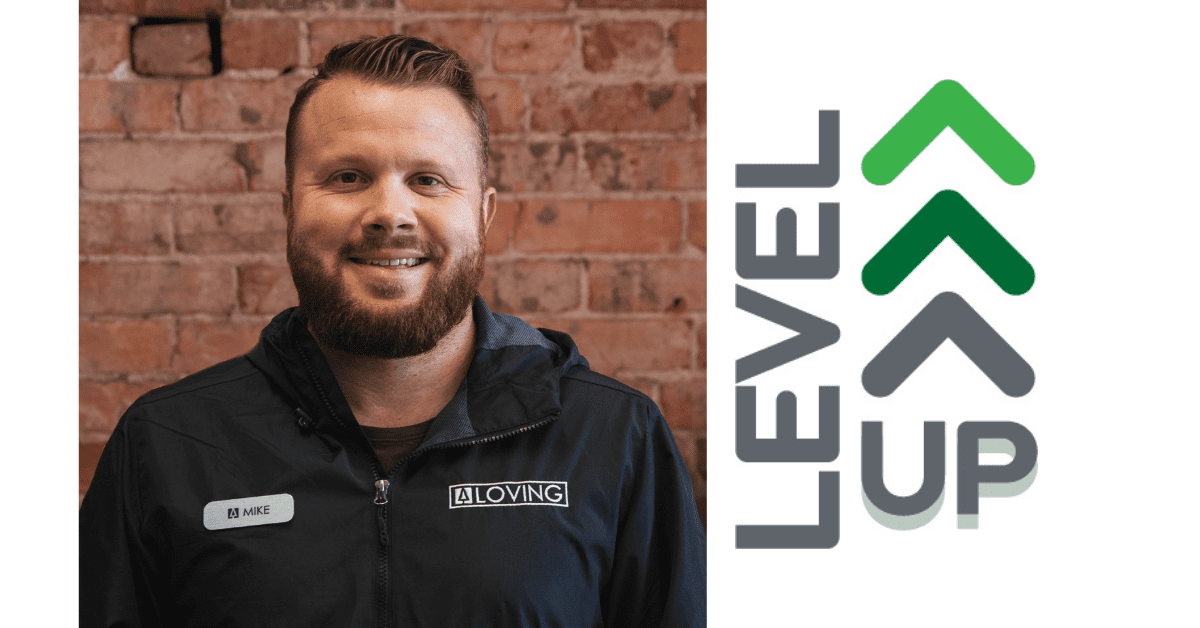
Our Level Up series shares the strategies that help landscape and lawn care companies get to the next level.
Mike Haynes knew in high school he didn’t want to attend college, so instead, he turned his childhood side job of mowing lawns in what is now known as LOVING, based in Gastonia, North Carolina.
“I’ve always had that entrepreneurial interest, even before mowing yards I was sitting in my parents’ driveway trying to sell basketball cards and baseball cards,” Haynes says. “My mom would take me to Sam’s and get the little fundraising boxes of chocolates and I’d walk around the neighborhood and they’d ask ‘Who is this for? Is if for your school or your church?’ and I’d say, ‘No, it’s just for me.’”
Haynes says his combined passion for the outdoors and making something beautiful drove him to make landscaping a career.
Six different companies fall under the LOVING banner, including their landscape installation business, outdoor living business, and sod farming business.
The company is approaching $100 million in revenue. Haynes says they don’t have an ideal company size they’re trying to reach but will continue to grow as long as they have the opportunity to create a positive impact. LOVING passes along 10 percent of all their profits to various outreach partners they work with.
“Obviously, the larger that we are, the more impact that we can make,” Haynes says. “We’ll continue to grow for as long as we feel like we have a team environment that feels like a team, as long as we’re serving our customer with excellence, and as long as we’re putting out a product that we’re proud of, we’ll continue to grow.”
He says while they’ve already experienced incredible growth he believes they’ve only scratched the surface.
Narrowing Their Focus
Starting out LOVING was just mowing lawns, but Haynes added residential landscaping as a service as they grew.
“Word of mouth is really what’s given us all of our business,” Haynes says.
Word of mouth is also what led to LOVING find their primary client base of homebuilders.
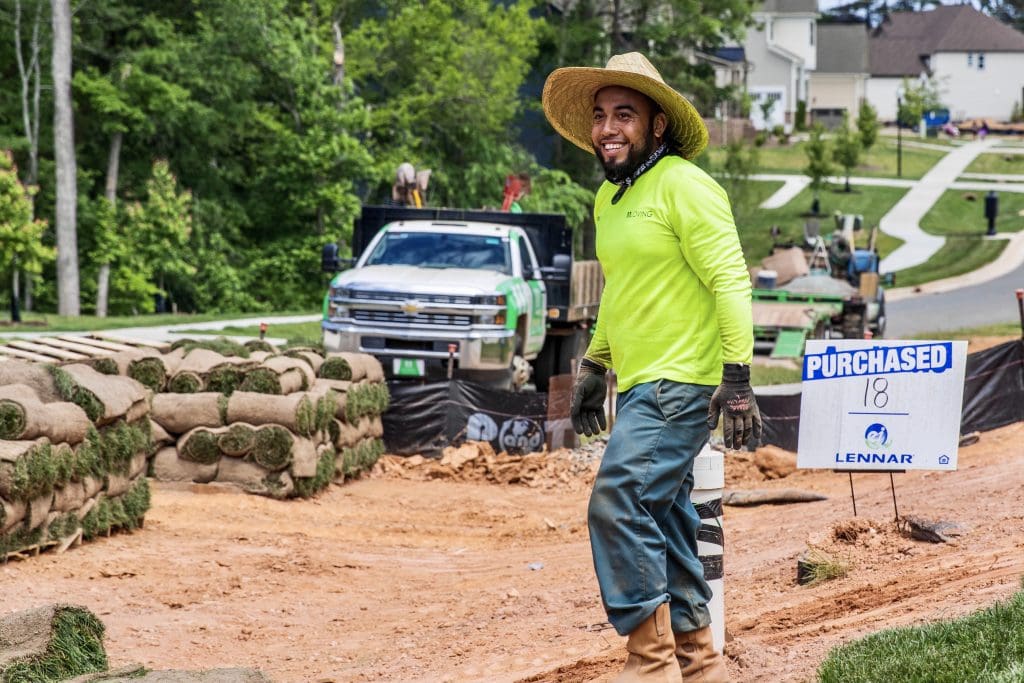
“We’re a little bit nontraditional for most companies, as maintenance is not our main focus,” Haynes says. “We serve national homebuilders. We do the landscape installation, the sod installation, we do outdoor living for them and then we also have sod farms throughout the Southeast.”
In 2009-10, the company was doing a lot of post-close work in a community developed by Pulte Homes. The division president for Pulte Homes, who heard of LOVING from the satisfied homeowners, reached out and asked if Haynes would like to work for them.
“At that time, I’d always heard ‘Hey, with home builders they don’t really pay their bills very well, and you got to be the lowest price,’ so for me I was never really intrigued by that, because obviously that’s not really exciting to be the lowest price and then wait to get paid,” Haynes says. “But this division president said, ‘Look, I promise that it’s not all about price and at the end of the day you have my word you’ll get paid.’ So, we said hey we’ll make a run at it and try it out to see if we liked it, and literally fell in love with it from day one.”
Haynes says he likes the ability to systemize and create a manufacturing environment, compared to custom residential work. He says with the homebuilding work they had the ability to scale the business. After a couple of years, they had quickly built up their reputation and were working with a number of homebuilders.
Haynes says they made the decision to double down on the homebuilder work and moved top-notch leaders from their custom residential side of the business to the production side where they could go from overseeing two crews to six or seven crews.
“A lot of people thought we had lost our minds because, again from the outward optics, it was they’ve got a great custom business,” Haynes says. “We’re doing very high-end work. Why in the world would you stop doing that? Why would you stop doing that and move over to homebuilder work, which is not really the same sexy type of work, but we just felt confident was the right thing to do, so we could really focus on trying to build out the foundation with homebuilders.”
This shift was a pivotal point for LOVING and Haynes says narrowing their focus was a blessing for them.
“Our ability to be able to grow our business by offering fewer services has really allowed us to work to perfect, we still have a long way to go, but work to perfect a lot of the processes around what we do,” Haynes says.
One process LOVING has developed is their guaranteed sodded landscape, which solves the builder’s pain point of having to replace dead sod a few days prior to closing.
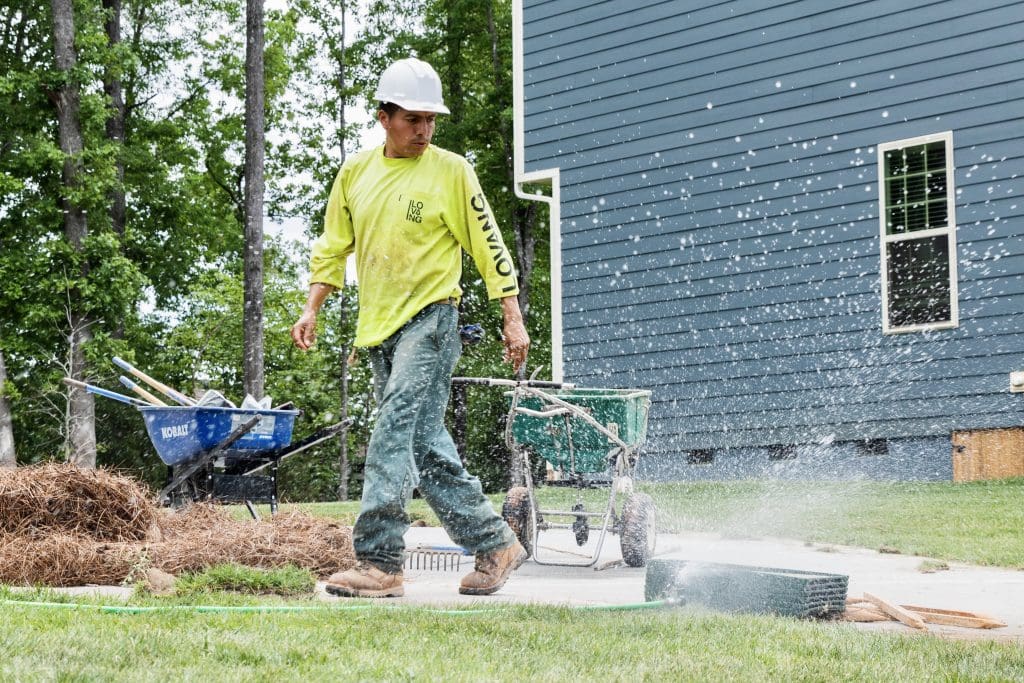
Now LOVING sends watering technicians out to the site every single day to make adjustments to ensure the sod is being watered properly. It helps LOVING not having to replace the sod as often and helps the builders because they don’t have that replacement cost and their customer satisfaction scores are climbing.
In 2015, LOVING started their first sod farm, as there were only a few existing sod farms that could supply the volume they needed.
“We got into sod farming for nothing other than being able to ensure that we can show up on time and on budget,” Haynes says. “Obviously, the sod farming has grown to become one of the larger parts of our business. We now sell to, not just our sister companies, but we sell to the public. We sell to landscapers.”
In September this year, they launched nextDAYsod.com, which delivers sod throughout the Southeast. For those who get their order in by 9 a.m., they will receive their sod by 9 a.m. the following day.
While LOVING no longer does custom residential work, they do try to align with custom providers in each market they serve. They often get a lot of contacts asking for them to come and add custom additions like a grilling island or fire pit. Haynes says they have looked it and tested pilot programs, but they feel strongly they need to keep their focus pretty linear.
LOVING has developed a couple of products that are exclusive to their company like their grilling islands and fireplaces. They partner with installers in each market and give them the right to utilize these products.
“That way, if someone bought a grilling island from Lennar Homes or DR Horton Homes, and they say ‘Hey I want a fireplace that matches it’ that way they can have a fireplace that matches it from a design perspective,” Haynes says.
LOVING has also built out their outdoor living program to be something that builders can give away as an incentive. This is a common practice for builders to move the sale of homes without dropping the price of their houses during a buyer’s market.
“Our strategy has been all along to continue to lay the foundation for our outdoor living program that way in the downturn, although our installation will go down because our units will without a doubt move down, we’ll see a spike with our outdoor living program because builders will go back to saying, ‘I need to figure out how to sell this to you, and I’m going do anything I can. If you sign the contract today, I’ll give you a free grilling island.’”
Growing Pains
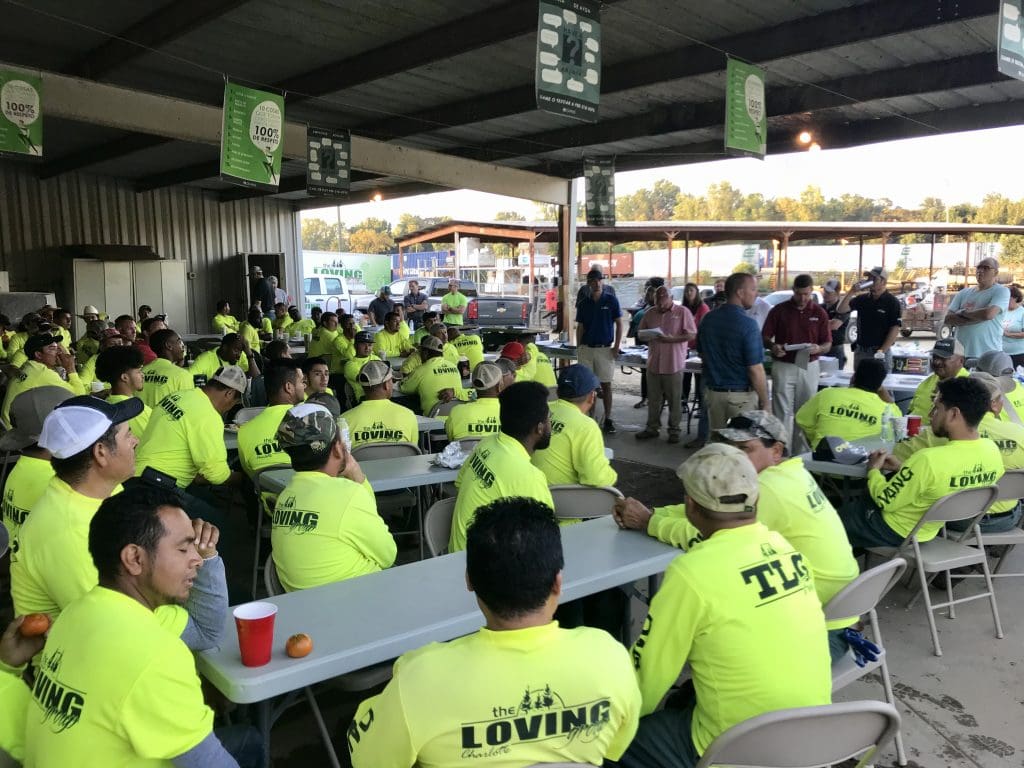
Haynes says the company’s growth has not been steady, but they’re trying to get better at forecasting and seeing opportunities further away. He says the reason they’ve been able to continue to grow is because of their team who works hard and has a learner’s posture.
“Growth is hard,” Haynes says. “That’s what a lot of folks don’t realize is that yes, growth is sexy and it is fun and it is cool, but if we didn’t have a team that was really committed to our vision at the end of the day we couldn’t continue to grow, because you’re constantly learning new things.”
He says that growing at a fast pace and trying to implement processes is like trying to change a tire while going 75 mph down the highway.
“A great team covers your lack of process, platform, and technology, because what they’re doing is boots on the ground common sense,” Haynes says.
He says as companies grow and departments get siloed, common sense things can be harder to hold on to, which is why processes are necessary.
“What we’re focusing on right now is building out the platform, not for today, or even next year’s needs, but how do we look out three, four, or five years?” Haynes says.
LOVING joined NALP in 2019 at the encouragement of Marty Grunder. Haynes says he did some research and realized it was going to be very beneficial for their team.
“It gives you a toolbox,” Haynes says. “It has a lot of different perspectives and a lot of different ideas, different solutions. I’m sure there’s things in the toolbox that we think are super valuable that maybe someone else thinks ‘oh I already got this figured out.’ But for us it’s great because a lot of times there isn’t sharing between organizations.”
He says NALP is a game changer if you have a learner’s posture.
Haynes predicts that nextDAYsod.com will enable them to grow even faster as there is less of a labor burden on the sod farming side of the business.
Replacing Traditional Branch Model
Currently, LOVING has around 300 in-house employees, but they are moving to where 70 to 75 percent of their installation work with be done through subcontractors.
LOVING’s subcontractors lease LOVING-branded trucks and wear shirts that say they are proud contractor of LOVING. In 2020, the company piloted having an owner/operator structure, rather than a traditional branch model.
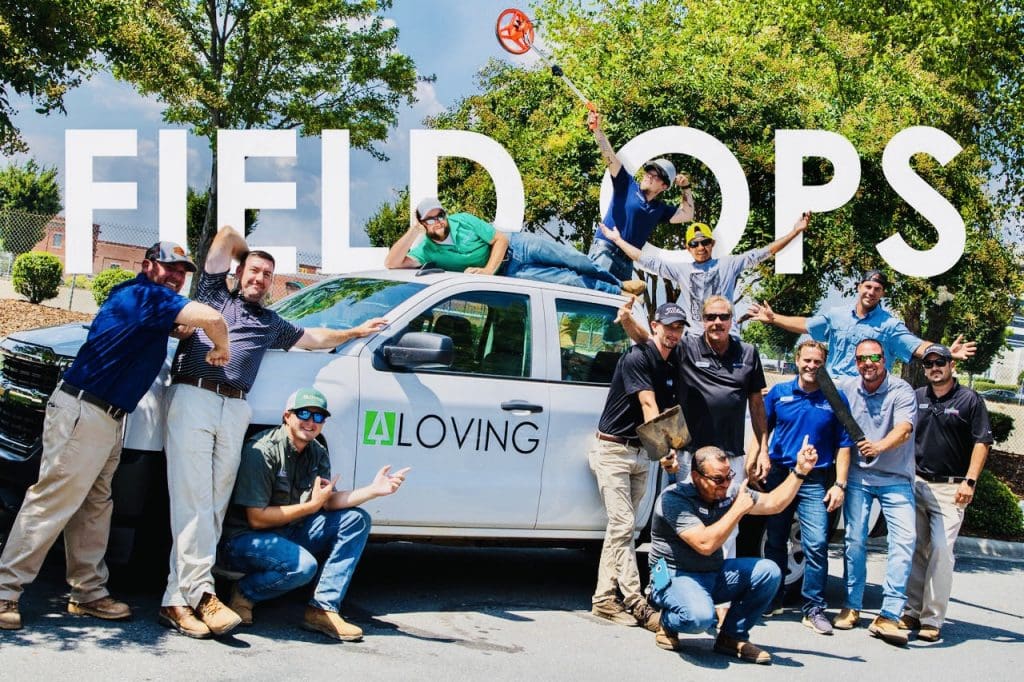
“What we’re trying to do is empower the next generation of owner operators,” Haynes says. “We believe as a business the traditional branch model is a little bit archaic. At the end of the day, it carries a lot of overhead, and it carries a lot of cost that doesn’t really benefit anyone.”
Haynes says they use their distributor network to get the materials to jobsite so the contractors only need to get labor to the jobsite.
“We believe it’s going to give the opportunity for specifically minorities that have not had the opportunity to be their own business owner, to be their own business owner because what we’re doing is providing them the platform to operate within,” Haynes says. “They have one responsibility and that is staffing. I’m not saying that’s a little thing these days, but they’re not having to worry about inventory management, fleet management and collections. They’re not having to worry about contracts and they’re not having to worry about all of these things that traditionally are really the barrier to entry for most landscapers.”
While LOVING currently has five branch locations, their plan is to ultimately shut down these locations and empower their employees to start their own businesses.
“Our goal is to disrupt the branch model, and we’ve made it clear to all of our current branch structure that we want to assist anyone who wants to go into business for themselves to become a subcontractor partner of LOVING so they can do the same work but make more money as an owner,” Haynes says.
Culture and Core Values
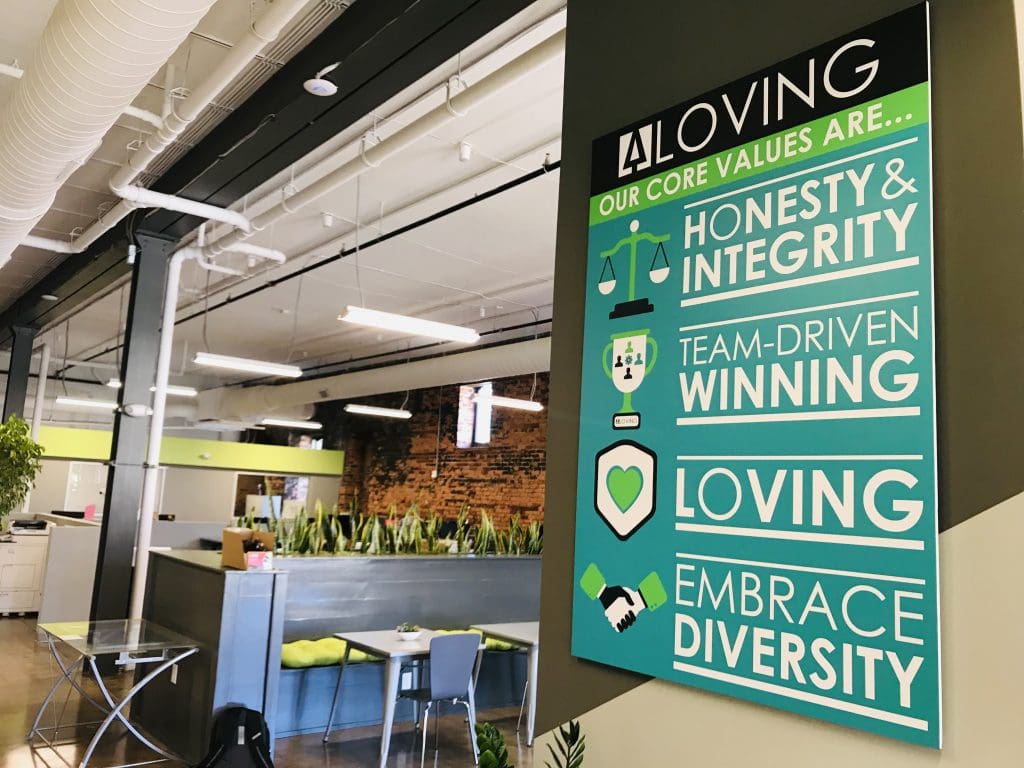
While being spread out across the Southeast, Haynes says the key to maintaining their company culture is rooted in the hire. He says they look for every reason why a hire won’t work, rather than every reason why they will. Haynes says this isn’t them being negative, but they know the danger of bringing on individuals who don’t align with the culture.
“Because we have a culture that doesn’t have all the processes and the guardrails in place, we have to make sure that we can empower people,” Haynes says. “The way you empower is that you trust. So let’s make sure that we’re vetting someone’s character before bringing them in, because unfortunately I’m not putting them in a box, I’m putting them in a high-growth environment that might not have all of the details outlined.”
Haynes says they make sure to model their core values daily, so their team sees they aren’t just marketing talking points. He says while they aren’t perfect and make mistakes, having authenticity is what is important.
“I think as long as we maintain an authentic desire to have team-driven winning, honesty, integrity, loving, as long as we make sure that we’re hiring people that embrace intensity then ultimately it’s a matter of just making sure that leaders are then creating the environment that’s authentic,” Haynes says.
He credits their marketing team and HR team are partnering together to figure out if they’re attracting employees with their recruiting efforts and if those efforts bringing in the right people.
“There’s a tendency to say ‘I am doing it this way and this is the way I’m going to do it,’” Haynes says. “Hey, if it’s not working, it doesn’t mean it was a bad ad, it just means it’s not resonating today.”
Haynes says they are constantly evaluating their retention and conduct exit interviews with every employee to determine what drove their decision to leave LOVING. He says they don’t want to hold people back from better opportunities but wants to find out if they’re losing people due to poor communication or something else.
LOVING also helps their team reach their full potential through LOVING University, which is a tuition reimbursement and continuing education program they started in 2018. Haynes says they’re going to focus more on this program in 2022 and make sure it is aligned with how people learn and engage today.
Click here to read more Level Up stories.


Comments are closed.